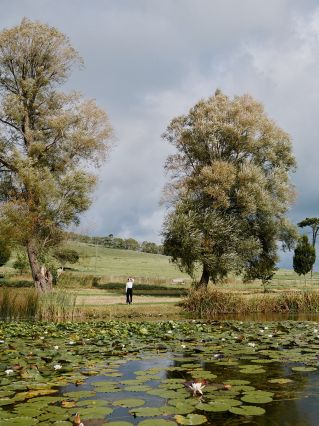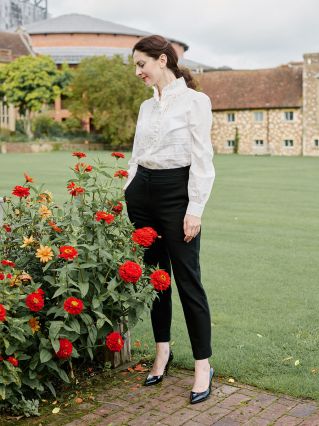Elena Tsallagova – Mein Seelenort: Das Opernhaus von Glyndebourne - Deutsche Oper Berlin
From Libretto #3 (2024/25)
Elena Tsallagova – My feel-good location: the opera house at Glyndebourne
Elena Tsallagova sparkles as the Infanta in our production of THE DWARF. She draws her inspiration from an English opera house that began life as a country mansion
The seat of my contentment is the opera house at Glyndebourne, a two-hour drive from London, not far from the south-east coast of England. I had my first big engagement here in 2009 playing Nannetta in FALSTAFF, a.k.a. Ann Ford for English audiences. The story, set among the English aristocracy, is tailor-made for Glyndebourne, although I didn’t realise it at the time when I set off for Lewes by train and was convinced I had to be travelling in the wrong direction. In my mind an opera house was a Classicist edifice with huge columns flanking the entrance and located on some grand metropolitan square, whereas there I was rattling through the rolling English countryside with sheep and cows on either side and locals going about their business outside Victorian manors – ultra »old fashioned« and stylish. And suddenly this former country pile with a modern opera house beside it reared up out of nowhere. I was hooked from the start. Whenever I go back, I get echoes of that first train journey.
The story behind Glyndebourne is very British and a touch eccentric – and also a love story. John Christie, a country squire with a weakness for the Wagner Festival, added an organ room to his manor house, with the aim of hosting private opera functions. At one of these events he met and fell in love with a soprano, Audrey Mildmay. Shortly after their wedding he had a sumptuous opera house built, butting onto the organ room, to fulfil his wish to transpose the Bayreuth atmosphere to the wilds of Sussex. The couple’s project grew and thrived, with festivals becoming more professional with each passing year and the reins eventually passing to the next generation. Following a number of extensions to the annexe, John’s son, George, had a new ultra-modern opera house built immediately adjacent to the manor. Private functions for 50 friends had become a world-famous opera festival playing to up to 1,200 people a night.
The Glyndebourne Festival is a dyed-in-the-wool British event. Performances begin around midday to allow audiences time to stretch their legs and picnic in the gardens during the 90-minute interval – dressed in their finery, which goes without saying. Not that black tie and evening gowns are mandatory, but people like to dress with style in this part of England. I love that, in fact I love everything about Britain, the culture, lifestyle and traditions that stop short of closing their eyes to new ideas. I felt drawn to British culture way before I came here for the first time. Only recently, though, did I realise that part of my fascination has to do with the English drama and stage tradition. I can still draw on the specifically English, realistic style of acting in my learning curve. I see it time and again when I watch English films or plays. I should say, though, that Glyndebourne didn’t become my place of soulful serenity until my second stint her in 2013, when I met my future husband, Ian Jackson. He grew up in the area and made his first appearance on the opera stage here at the age of 12 as a member of the children’s chorus in CARMEN. He’s now »Head of Planning and Company Management«. His entire life has revolved around Glyndebourne.

I’ve quite taken to the area too, even more so since we moved to a small village not far from the opera house. I travel so much in the course of my work that I only get to spend extended periods of time here in the summer and at Christmas, but whenever I get the chance I go for a walk in the parkland around the opera house – it’s a way I have of winding down. When I crest one of the gentle hills and catch sight of farmers bringing in the harvest, I get a surge of happiness. For me, this happy mood is conducive to focusing and absorbing new stuff. I’ve done all my studying of new roles here, walking through the countryside or sitting on one the many park benches.
That’s how it was with the part of the Infanta in Zemlinsky’s THE DWARF, although only up to a point, because there came a time when I needed some help from Elda Laro, the Deutsche Oper Berlin’s pianist, conductor and coach of many years standing. Elda is incredibly musical and sensitive. I have her to thank for my entire repertoire. I can honestly say that she’s one of the most important people in my life. There are times when she’s the only reason I’m travelling to Berlin.

Another person, the director Tobias Kratzer, was a big help to me when I was getting to grips with the role. He has the rare gift of knowing what people are capable of achieving even before they do. Donna Clara was the first negative character I ever played. She receives a dwarf as a present on her 18th birthday and proceeds to treat him like an object. She’s emotionally cold and egocentric. But through my chats with Tobias I came to see another side of her and almost pity her. She’s the saddest protagonist in the opera because she’s so caught up in her own self-centredness that she can’t give way to feelings or vulnerability. She loves the dwarf’s singing but is startled and horrified by her own positive response to it. What an utter tragedy. I’m already looking forward to expressing her inner turmoil on stage in Berlin, my home from home.





